| Heritage Collectors' Society |
 |
| Questions? Call us at 215-345-7955
or toll-free at 800-560-2545 |
|
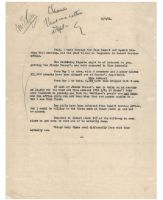 THOMAS A. EDISON (1847-1931)
|
| THOMAS A. EDISON (1847-1931) |
Inventor, businessman
Thomas Edison (1847-1931) was arguably one of the most influential people in all of history. Credited with "inventing" the Twentieth century and developing the modern research laboratory, he was the most prolific inventor in history with 1,093 U.S. patents in his name as well as patents in the United Kingdom, France and Germany. His numerous inventions included the electric light bulb, the phonograph and the motion picture camera.
Edison owned numerous companies including Thomas A. Edison, Inc, which oversaw his early recordings. The standard of the day was the phonograph and the phonographic wax cylinder. The cylinder was a tube containing up to 2 minutes recorded music. In 1912, Edison introduced the new Blue Amberol Cylinder. More durable than the previous design, these new cylinders could hold up to 4 minutes of recorded music. Edison's company would continue to sell cylinders until they went out of business in 1929.
This typewritten note, dated May 7, 1921, was composed by Charles Edison, son of Thomas Edison, to his father. It discusses the inefficiency of the Blue Amberol division of Edison's company. The content specifically compares employee Jimmie Carson and his team to the team working on Blue Amberol. Charles determines that the Blue Amberol division is not working to its full potential and suggests that the team manages to make itself look busy when necessary. Thomas Edison has written a personal note at the top, "Charles. This is a rotten dept." and includes his prominent initial, "E."
|
|
 |
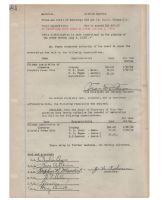 THOMAS A. EDISON
|
| THOMAS A. EDISON |
PART 2 OF MINUTES DOCUMENT
See Part 1 for description
|
|
 |
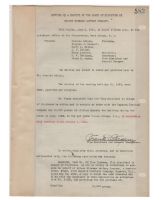 THOMAS A. EDISON (1847-1931)
|
| THOMAS A. EDISON (1847-1931) |
American inventor
American inventor whose inventions included the phonograph, the motion picture camera, the light bulb among many others. He is the fourth most prolific inventor in history with 1,093 U.S. patents in his name as well as patents in the United Kingdom, France and Germany.
Minutes of a Meeting of the Board of Directors of Edison Storage Battery Company," dated June 5, 1922. Presided over by Mr. Charles Edison, the board authorized the purchase of 16,000 pounds of lithium hydrate. Additional issues discussed were the annual renewal of memberships for in two organizations: Chicago Association of Commerce and the Electric Power Club.
The document was signed by the Board which included "Charles Edison," "Thos A Edison," "Stephen B. Membert," Harry "H.F. Miller," "J. V. Miller," "Henry Lanahan" and Secretary, "J. W. Robinson."
|
|
 |
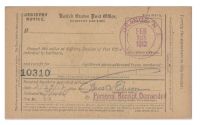 THOMAS A. EDISON (1847-1931)
|
| THOMAS A. EDISON (1847-1931) |
American inventor
American inventor whose inventions included the phonograph, the motion picture camera, the light bulb among many others. He is the fourth most prolific inventor in history with 1,093 U.S. patents in his name as well as patents in the United Kingdom, France and Germany.
United States Post Office receipt dated February 26, 1912 and first received by the Orange, New Jersey post office. Number 10310, the registry notice was presented to Edison on February 27, 2012. A great signature, the document is signed "Thos. A. Edison."
|
|
 |
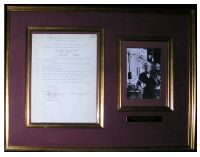 THOMAS A. EDISON (1847-1931)
|
| THOMAS A. EDISON (1847-1931) |
Inventor, businessman
American inventor whose inventions included the phonograph, the motion picture camera, the light bulb among many others. He is the fourth most prolific inventor in history with 1,093 U.S. patents in his name as well as patents in the United Kingdom, France and Germany.
This museum quality frame measures 24" x 19" houses two smaller frames. The left frame, measuring 8.5" x 12.25," features the typed "Minutes of a Meeting of the Board of Directors of Edison Storage Battery Company," dated February 1, 1921. Presided over by Mr. Charles Edison, the board allotted a portion of the meeting to discuss the "reduction in price of Caustic Soda from Mathieson Alkali Works, Inc." The document was signed by the Board which included "Charles Edison," "Thos A Edison," Harry F. Miller, John V. Miller and Secretary, "Arthur Mudd." The right frame, measuring 7" x 9.5," displays a photography of Thomas Edison.
|
|
 |
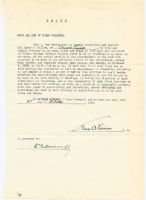 THOMAS A. EDISON (1847-1931)
|
| THOMAS A. EDISON (1847-1931) |
Inventor, businessman
Invented the phonograph, developed the electric light bulb and the motion picture projector. Typed document of the Edison Storage Battery Company concerning proxy voting. The proxy empowers Edison's son Charles to act on his father's behalf at the annual shareholders' meeting, the first such meeting after the great stock market crash a few weeks earlier. Boldly signed with an especially fine example of Edison's famous "umbrella" signature. Dated October 31, 1929
|
|
 |
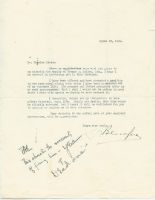 THOMAS A. EDISON (1847-1931)
|
| THOMAS A. EDISON (1847-1931) |
Inventor, businessman.
Invented the phonograph, developed the electric light bulb and the motion picture projector. Typed letter of resignation from an employee of Thomas A. Edison Inc., dated August 27, 1924, addressed to Charles Edison. Charles has commented and forwarded the letter to his father, writing "T.A.E., This obviates the necessity of firing him." Thomas Edison has added below, "Yes - Dead one. E." An intriguing glimpse inside Edison's pioneer research laboratory.
|
|
 |
|
|

